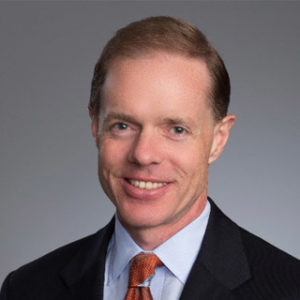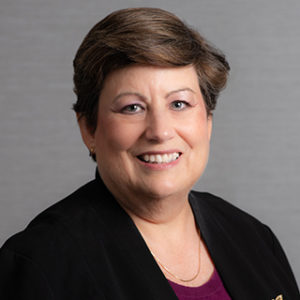Taking a Sales Tax “Spin” with David Hughes
Welcome to the second in our new series of profiles of Sales Tax Institute faculty members. I recently sat down and chatted with David Hughes, who is a partner at the law firm of Horwood Marcus & Berk here in Chicago.
I’ve known David for a number of years and work with him on the Chicagoland Chamber Tax Committee as well as at COST. David first taught at the Sales Tax Institute in 2014 at the Advanced Sales and Use Tax Workshop in San Francisco. He joined us at the 2015 and 2016 Advanced workshops, as well as our 2017 and 2018 Basics of Sales & Use Tax Course.
We sat down to discuss David’s career path in sales tax, what keeps him excited about working in the field, and what advice he has for young professionals just getting started. He has some great insights to offer for beginners and pros alike. Read on to see what he had to say.

Tell us a little about yourself and how your career path lead you to working with sales tax.
David: I have been practicing for over 25 years as an attorney. I started my career at McDermott Will and Emery in Chicago, and I was originally a member of their federal tax practice. There was another attorney in the tax group who sat next to me, and he was a full-time SALT lawyer. He had a lot of work to give out to the younger associates. Because I sat next to him, I ended up getting the lion’s share of that work!
A lot of that was sales tax work, and I took a liking to it. About 18 months after starting at McDermott, I had the opportunity to do SALT full-time at Horwood Marcus & Berk, which included both sales tax and income tax work. That was 1993, and I have been there ever since.
What do you find most compelling about working with sales tax? What keeps you excited about working in this field?
David: I’ve discovered something about sales tax over the years: You have 45 different states that have some form of a sales tax, and when you explore the details and nuances of those state laws, there will be differences. In addition to the state level, there are a lot of jurisdictions with their own sales tax laws. But despite all of that, ultimately, there are some basic building blocks to sales tax that are uniform and common from state to state.
It’s been an interesting challenge to figure out what those building blocks are. I’m certainly not suggesting that sales tax is in any way easy. It took me a while to get to the point where I feel comfortable with basic concepts, principles, and rules that really do apply from state to state.
I remember when I was a young attorney, when my co-worker would give me an issue or a problem to look into, it didn’t matter what the state was, he would say, “This is what the answer should be. Go and confirm it for me.” And that was because he had an understanding himself of what these basic concepts and principles are. Ultimately, there may be some nuances and some twists that you have to find and confirm. But for the most part, sales tax follows basic principles. And once you get comfortable with these and understand them, it becomes kind of intuitive and you can sense what the answer should be, and a lot of times you’re just looking to confirm it.
That’s great advice, and it should be reassuring for young sales tax professionals who are just getting started in their careers. What do you consider to be your area of expertise, and what sales tax topic are you most passionate about teaching?
David: There is a lot of overlap between my specialty and what I’m most excited about teaching. Broadly speaking, titled property is my specialty. That includes cars, planes, boats, and most specifically, cars. In spite of the common patterns in sales tax that I mentioned, I think the one place where that breaks down is with vehicles, specifically in titled property, because a lot of states have special and unique rules for titled property. Whenever I have an issue involving titled property, I always have to take a step back. There are so many exceptions to the typical rules, and it’s just not as intuitive.
The classic example for me is how in Illinois, a car dealer that is in one of the six counties that surround Chicago is required to collect the Chicago use tax if the buyer is from Chicago. It essentially determines the local tax based on buyer location rather than retailer location, which is completely opposite from all other sales of tangible personal property in Illinois. That’s just one example of how with motor vehicles, sometimes you’ve got to take a step back and really think twice about what the rule might be and really make sure you’ve looked hard at it to know that you’ve gotten it right.
That’s a great example – despite the commonalities, you’ve still got to do your homework when it comes to sales and use tax laws. Do you remember your first time teaching a Sales Tax Institute course? What do you recall about the experience?
David: My first time teaching with the Sales Tax Institute was at the 2014 Advanced Workshop in San Francisco. The thing that I remember the most was the level of experience and knowledge among the people attending. The attendees were really experienced, sophisticated and knowledgeable. They had great stories to tell, great insights, a lot to share. People had good comments, questions and insights – you could tell it was a very sophisticated group.
That’s great to hear. The interactivity between faculty and attendees is one of the things that makes our Advanced workshop so special. Why do you teach for the Sales Tax Institute?
David: First, I do it in large part out of respect for you, Diane. I respect what you’ve accomplished and I want to be there to help you out. But I also do it because I learn a lot myself. Because the level of experience among the attendees is so high, I feel like I really need to put in the extra time getting ready for the course. And sometimes that forces me to learn some new material. So I get the opportunity to learn as well when I’m preparing for the course. The classes can be very interactive, with a lot of back and forth. And when the attendees are telling me their war stories and experiences, I learn from that as well. It’s very much a two-way street for me.
Thank you for the kind words! We appreciate everything you do for the Sales Tax Institute. What advice do you have for professionals who are just getting started in sales tax?
David: Don’t get frustrated. On the one hand, sales tax can be very intimidating, because not only do you have 45 sets of state laws, you also have a lot of local jurisdictions with their own laws. The details can and will vary from state to state. But if you take a step back, a lot of these rules follow common patterns, as I mentioned before. It might take a while to figure out what those patterns are, but once you’ve figured those out and it’s become intuitive to you, it’s not as intimidating. You still need to check the rules and laws of the state to make sure exactly what the answer is, but getting there is not as frustrating once you understand what these laws are trying to accomplish.
What do you see for the future of sales tax?
David: I see sales tax changing, maybe at a glacial pace. I should clarify: sales tax either is changing or it has to change. Sales tax laws in many states have not been updated since they were originally adopted, which could be generations ago. And the nature of business, our economy, how people do business, and how they deliver products and sell services – all of that has radically changed, even in just the last couple years. t has certainly changed since states adopted their sales tax laws.
And while some aspects of those laws have changed and some have been updated to account for the changes in how companies do business, in a lot of respects, they have not. And it puts a Department of Revenue in a position where they try to force square pegs into round holes. And that can put taxpayers in a very difficult position., A company’s business model may not fall under a sales tax statute, yet the state feels like it should be able to tax that business. I think this is coming to a head. I think states are going to be challenged on this, and I think they potentially risk the loss of revenue if they don’t start amending their sales tax laws to catch up with how companies are doing business.
For our last question, we like to step away from sales tax. What do you like to do in your free time?
David: I’m a bit of an exercise buff. In particular, my wife and I have become spin cycle enthusiasts. We love to take spin classes at fitness centers or clubs. We even went so far as to splurge on our own high-end spin bike. That’s our favored mode of exercise, and it’s what I like to do if I’m not buried in sales tax.
I’d like to thank David for taking the time to sit down with us. I got a lot out of my conversation with him, and I thought you might too.
 About the Author:
About the Author: